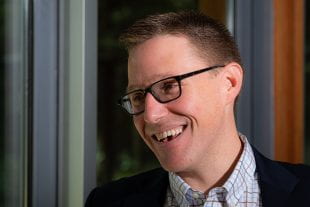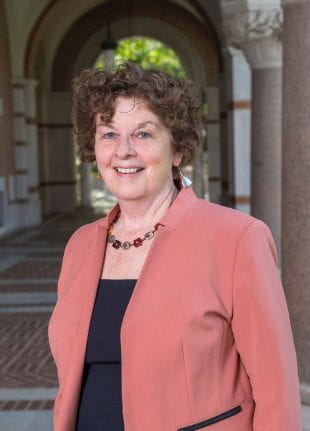Feb. 3 will mark the 150th anniversary of the ratification of the 15th Amendment, which granted black men the right to vote. Despite the amendment, discriminatory practices were employed nationwide — particularly throughout the South — to prevent blacks from exercising this right until the Voting Rights Act became law in 1965.
Aug. 18 will mark the 100th anniversary of the 19th Amendment, which provided women the right to vote. It was a victory that came, however, after nearly a century of organized protests by women’s rights advocates.
A popular new humanities course, Who Should Vote?, explores such questions as why an ostensibly democratic government would deny certain people the right to vote in the first place.
How were these decisions made as early Americans such as Thomas Paine and John Adams contemplated different forms of government for their new country? What are the residual effects of the contested presidential election of 2000? How will a new generation of voters affect our future?
“I’ve been here for about 11 years. And this is the first time that I’ve offered this class,” said Caleb McDaniel, associate professor of history, who told his 100 students he was excited to teach the at-capacity course. “It came from a new series of courses that the dean of the School of Humanities has put together called Big Questions.”
Most of the students in the course are not humanities majors, but that’s the idea.

History professor Caleb McDaniel is teaching the at-capacity Who Should Vote? course this semester. (Photos by Jeff Fitlow)
“In this sense, the course really fulfills our prime goal with the Big Questions courses, which is to invite students from outside the humanities into our courses and to allow them to see the ways in which humanities inquiry can help students make sense of the world they live in and the daily dilemmas our society faces,” said Kathleen Canning, dean of the School of Humanities.
Most of the students will also be of voting age for this fall’s presidential election. And this new generation is concerned with weightier questions than simply how the electoral college works — rather, why or why not?
Those types of big questions, Canning said, usually do not produce simple or straightforward answers.
“This course is exemplary in its invitation to students from all disciplines and schools at Rice to engage in the crucial work of interpretation on the basis of a range of sources that help trace the history of the vote, its restrictions and its exclusions in U.S. history, which remain relevant in this era of contested voting rights,” Canning said. “Ultimately the humanities seek to train students for the lifelong practice of engaged citizenship.”

“Ultimately the humanities seek to train students for the lifelong practice of engaged citizenship,” said Dean of Humanities Kathleen Canning.
McDaniel said that while he was planning to teach a Big Questions class this semester, he wasn’t expecting a “big Big Questions class” with enough students to fill a lecture hall. But thanks to two graduate students, history Ph.D. candidates Maki Kodama and Miller Wright, the course will retain certain qualities of humanities classes at Rice: namely, lots of time for smaller sessions and face-to-face discussions.
Who Should Vote? is joined this semester by Where Is Utopia?, taught by associate professor of art history Fabiola López-Durán and Josh Bernstein, a painting and drawing lecturer in the Department of Visual and Dramatic Arts. Throughout the course, the two ask their students to consider such as questions as: Does every “perfect” society imply a dystopian counterpart? Who is utopia for, and who is excluded?
These questions, Canning said, invites students to explore the way people imagined the future years ago, including the artistic and social experiments of Dadaists and Futurists in the 1920s and the creative and cultural rebellions of the 1960s.
“Utopias have their visionary, optimistic aspects — promising to change the world, to fashion a future that remedies the ills of the present,” Canning said. “And utopias are often imagined by the most creative forces in society: artists whose paintings and photos, sculptures and architectural designs, poems and novels aim to subvert and advance the restrictions of the present.”
This new course, Canning said, brings together a noted visual artist with an architectural historian to explore the history, theory and practice of utopia and the traces they have left on Houston and its surroundings — and to explore the dark sides of utopian ideals too.
“Utopia is a crucial lens for understanding modernity in its global dimensions,” Canning said.

